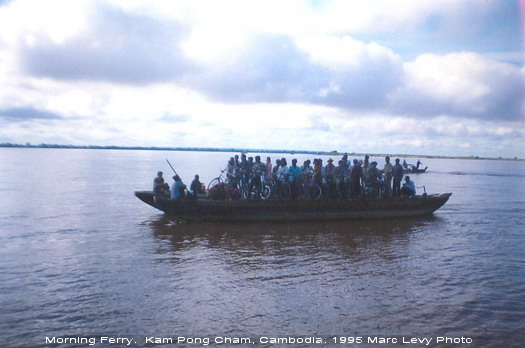
Trophies

The taxi from Phnom Penh to
Kam Pong Cham took four hours and
cost two dollars; the road back was mined. I found a guide, Japra, who owned a
beat-up motorcycle. Japra had thick black hair, large white teeth, was thin,
talkative, nervous. He had survived Pol Pot time. He smiled when I said, "Five
bucks a day and all you can eat." The next morning we rode two miles on a
crowded ferry made of sheet metal welded to barrels and powered by a diesel
engine. After disembarking, Japra touched the seat and I hopped on. I gripped
his belt, clenched my legs to the bikes metal thighs, turned my baseball cap
backwards, tied a red bandana over my mouth. Japra gunned the engine, then off
we went down high treed dirt roads, the villager’s a blur of waving hands,
fleeting smiles.
“I want to go to the French rubber plantation,” I shouted over the hot dry wind.
Japra leaned back. The words, “Khmer Rouge,” shot past me.
“No,” I said, “That’s not true. And besides, I pay more.”
The thought of adventure was magnetic.
The rubber trees stood in long neat rows that were eerily silent; morning sun
light tickled countless branches and delicate blue green leaves. It was quiet,
like an old cemetery at midnight. After a time we dismounted, trudged along
muddy trail; Japra pushing the bike like a baby carriage. All around us,
thousands of latex pearls dripped down winding paths inscribed in bark. At the
base of each tree the fragile porcelain cups seen on patrol, were now made of
plastic. Only our footsteps broke the silence.
We approached two Cambodian boys who clung to an old Chinese bicycle; they shyly pointed at
my white skin, touched and retouched its hair.
"What wrong?” asked Japra.
Vietnamese children had once done the same.
“Nothing,” I said. “Nothing. Let’s go.”
Further on, a sleepy guard in a torn blue uniform dozed against a spiraling
tree, a wood stocked AK-47 curled in his lap, its long triple-edged bayonet
tucked beneath the pitted barrel.
Alerted by our steps, the guard blinked awake. There were no Khmer
Rouge, he said. His orders were to shoot anyone who came to chop down trees.
The three of us sat together. No one spoke. Suddenly, I heard a jingling
sound. A dainty Cambodian horse in black leather harness stippled with bells
and pulling a small wooden cart briskly trotted past. A small girl held the
reins in one hand. The guard said she was headed for the latex factory.
Smiling, he aimed the assault rifle at her.
Japra and I followed the tiny hoof prints, the thin lines of the wagon wheels,
and the receding sound of the bells.
Twenty minutes later, our shoes and pants splattered with mud, I spotted several buildings. Closer up, I inhaled swirling chemical fumes, witnessed
deadly conveyor belts, chopping gears, snarling engines. A half dozen
black haired workers, dressed in blue cotton uniforms, ignored us as we
entered the factory.
Processed latex has the speckled look of kapok, the feel of spongy granite: It
is hard and thick and unforgiving. I tried cutting a
chunk from a heavy square block
stacked in a corner. I gouged and prodded with all my strength, then ripped away
a piece the size of a man’s ear.
Japra said, “You keep?”
“Yes,” I said.
Once, in a distant war, men called such severed things.... trophies
|
|